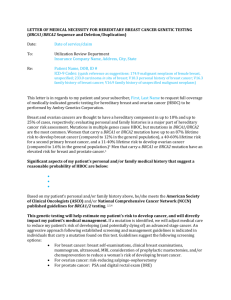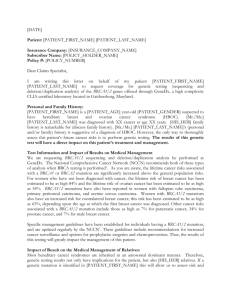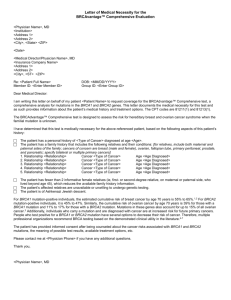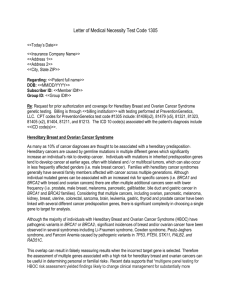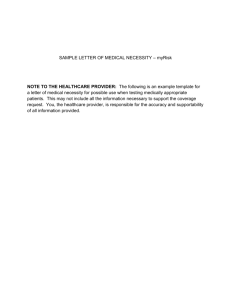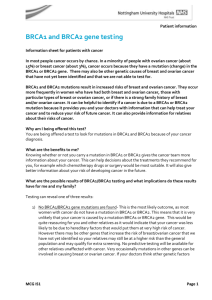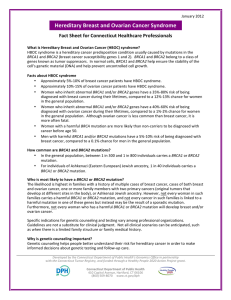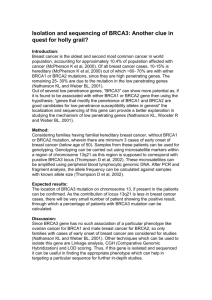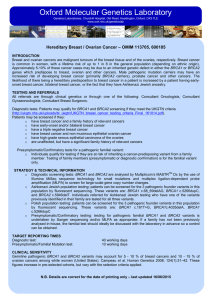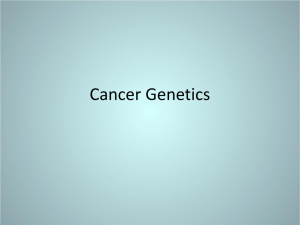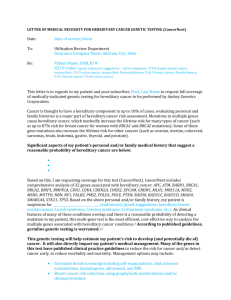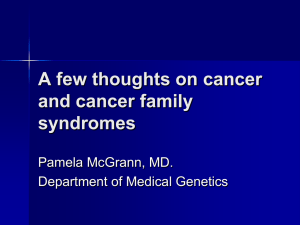as word document
advertisement
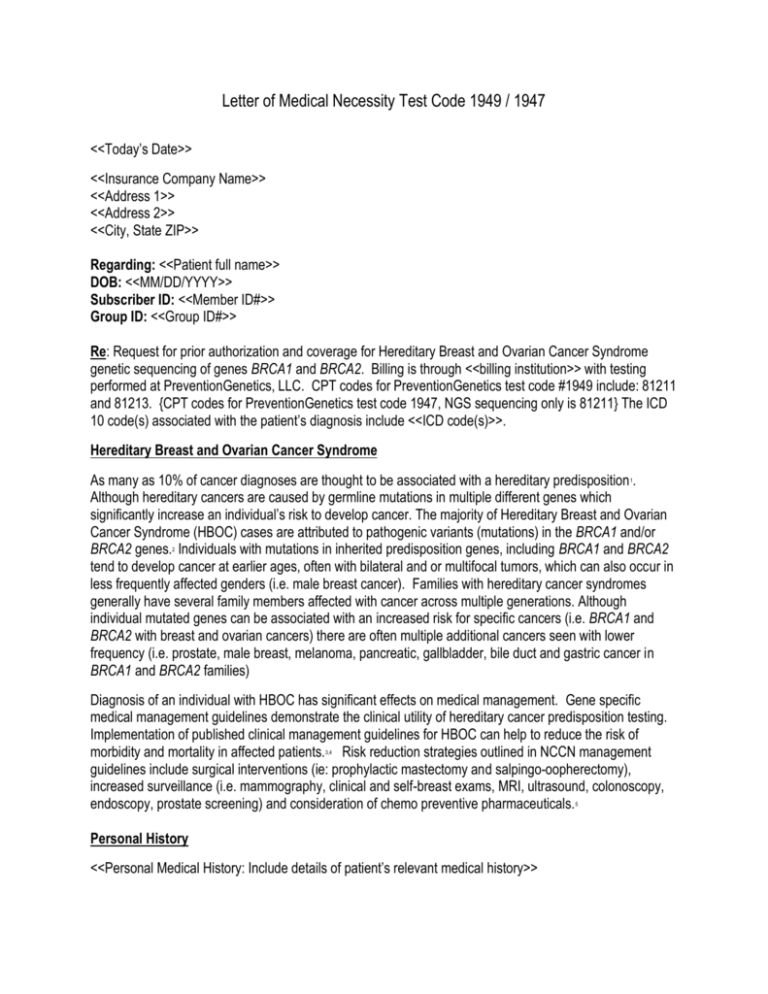
Letter of Medical Necessity Test Code 1949 / 1947
<<Today’s Date>>
<<Insurance Company Name>>
<<Address 1>>
<<Address 2>>
<<City, State ZIP>>
Regarding: <<Patient full name>>
DOB: <<MM/DD/YYYY>>
Subscriber ID: <<Member ID#>>
Group ID: <<Group ID#>>
Re: Request for prior authorization and coverage for Hereditary Breast and Ovarian Cancer Syndrome
genetic sequencing of genes BRCA1 and BRCA2. Billing is through <<billing institution>> with testing
performed at PreventionGenetics, LLC. CPT codes for PreventionGenetics test code #1949 include: 81211
and 81213. {CPT codes for PreventionGenetics test code 1947, NGS sequencing only is 81211} The ICD
10 code(s) associated with the patient’s diagnosis include <<ICD code(s)>>.
Hereditary Breast and Ovarian Cancer Syndrome
As many as 10% of cancer diagnoses are thought to be associated with a hereditary predisposition .
Although hereditary cancers are caused by germline mutations in multiple different genes which
significantly increase an individual’s risk to develop cancer. The majority of Hereditary Breast and Ovarian
Cancer Syndrome (HBOC) cases are attributed to pathogenic variants (mutations) in the BRCA1 and/or
BRCA2 genes. Individuals with mutations in inherited predisposition genes, including BRCA1 and BRCA2
tend to develop cancer at earlier ages, often with bilateral and or multifocal tumors, which can also occur in
less frequently affected genders (i.e. male breast cancer). Families with hereditary cancer syndromes
generally have several family members affected with cancer across multiple generations. Although
individual mutated genes can be associated with an increased risk for specific cancers (i.e. BRCA1 and
BRCA2 with breast and ovarian cancers) there are often multiple additional cancers seen with lower
frequency (i.e. prostate, male breast, melanoma, pancreatic, gallbladder, bile duct and gastric cancer in
BRCA1 and BRCA2 families)
1
2
Diagnosis of an individual with HBOC has significant effects on medical management. Gene specific
medical management guidelines demonstrate the clinical utility of hereditary cancer predisposition testing.
Implementation of published clinical management guidelines for HBOC can help to reduce the risk of
morbidity and mortality in affected patients. Risk reduction strategies outlined in NCCN management
guidelines include surgical interventions (ie: prophylactic mastectomy and salpingo-oopherectomy),
increased surveillance (i.e. mammography, clinical and self-breast exams, MRI, ultrasound, colonoscopy,
endoscopy, prostate screening) and consideration of chemo preventive pharmaceuticals.
3,4
5
Personal History
<<Personal Medical History: Include details of patient’s relevant medical history>>
Family History
<<Family History: Include list of relevant family history information if applicable. Appropriate risk
assessment models or limited history should be noted >>
<<Mr./Ms./Mrs./Miss patient last name>> meets the National Comprehensive Cancer Network (NCCN)
guidelines for BRCA1 and BRCA2 genetic testing due to his <<personal/family history>> of breast and/or
ovarian cancer.
Based on published NCCN guidelines, the personal and family history of this patient warrants HBOC
analysis. . ** Testing of the BRCA1 and BRCA2 genes through the HBOC NextGen Sequencing Panel,
with reflex (test code #1949) will reflex to the BRCA1 and BRCA2 Deletion/Duplication panel in the event a
pathogenic variant is not identified via NGS and will allow for delineation of appropriate screening and
management guidelines for this patient and his/her family members. **{Testing of the BRCA1 and BRCA2
genes through the HBOC NextGen Sequencing Panel (test code #1947) will sequence via NGS, without
reflexing to the deletion / duplication panel,}
5
The laboratory providing the genetic testing is PreventionGenetics, LLC, (Tax ID: 83 0343803) who is a
sponsor of Pediatric Lab Utilization Guidance Services (PLUGS®). PreventionGenetics is committed to
providing comprehensive, high quality, and affordable genetic testing that adds value to patient
care. Through utilization management strategies at PreventionGenetics, over 1.3 million healthcare dollars
are saved annually.
I am hopeful that we can work together for <<Mr/Mrs/Ms/Miss patient’s last name’s>> benefit. Please
contact me at <<Phone #>> with the result of this prior authorization and/or if you need additional
information.
Sincerely,
<<Name, credentials>>
<<Title>>
<<Institution>>
References:
1.
2.
3.
4.
Mauer et al. Genetics in Medicine. 2013
Petrucelli et al. GeneReviews. 2011
Domcheck et al. JAMA. 2010;304 (9): 697-975
Finch et al. J Clin Oncol. 2014;32(15):1547-1553
NCCN Clinical Practice Guidelines in Oncology (NCCN Guidelines ). Genetic/Familial High-Risk Assessment: Breast and
Ovarian. Version 2.2015, 06/25/2015.
®
